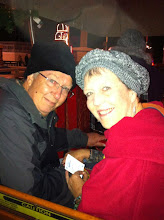
This is another of those words that was supposed to be something else, but I spotted the word, "Theologian" this morning while flipping through a magazine looking for something else, and my heart sang
I love theology, and I've unofficially considered myself a theogian for a while now. I'm not university-trained, and others might not consider me a theologian because of the lack of education. That's ok, but Denise Ackermann, in her book After The Locust, gave me permission to believe that I am and to even say that I am.
The subtitle to Ackermann's book is "Letters from a Landscape of Faith", and that's what each chapter is--a letter to someone close to her. Her chapter on theology is a letter written to her dead mother, trying to explain the difference between a theologian and a "dominee", and trying to explain her passion for theology. Ackermann's mother never understood her desire to study theology, and never quite accepted it. She wasn't particularly religious herself and didn't particularly care for religious people. And Denise was a bit of a disappointment because she was.
I love theology, and I've unofficially considered myself a theogian for a while now. I'm not university-trained, and others might not consider me a theologian because of the lack of education. That's ok, but Denise Ackermann, in her book After The Locust, gave me permission to believe that I am and to even say that I am.
The subtitle to Ackermann's book is "Letters from a Landscape of Faith", and that's what each chapter is--a letter to someone close to her. Her chapter on theology is a letter written to her dead mother, trying to explain the difference between a theologian and a "dominee", and trying to explain her passion for theology. Ackermann's mother never understood her desire to study theology, and never quite accepted it. She wasn't particularly religious herself and didn't particularly care for religious people. And Denise was a bit of a disappointment because she was.
I'll just note here a couple of her quotes, and maybe you'll see why she blessed me so.
Writing to her mother, "I owe you a more thoughtful explanation about what I mean by theology. I need to tell you how I stumbled into theology and how, as a woman, I found my own voice as a theologian...I must admit that I am still sorting this out for myself...the connections between theology, feminism, ideology, the bible, the church, and the way we speak about God. I wish this were a straighforward task. Instead it is confusing, even muddled, as I try to discern what is life-giving from what is stifling, even noxious."
"Doing theology requires faith, whereas studying religion does not."
"Theology gripped me."
Quoting a rabbinic saying..."theology is worryng about what God is worrying about when God gets up in the morning...God is worrying about the mending of creation, 'trying to straighten up the mess so that all of groaning creation can be set free.' Theology is sustained reflection about what we worry about, what we believe, and what we do about what we believe."
"Theology demands an engagement of the mind and the heart."
"Theology gripped me."
Quoting a rabbinic saying..."theology is worryng about what God is worrying about when God gets up in the morning...God is worrying about the mending of creation, 'trying to straighten up the mess so that all of groaning creation can be set free.' Theology is sustained reflection about what we worry about, what we believe, and what we do about what we believe."
"Theology demands an engagement of the mind and the heart."
Quoting theologian, Jurgen Moltmann, "It is simple, but true, to say that theology has only one, single problem: God. We are theologians for the sake of God. God is our dignity. God is our agony. God is our hope."
"All people (not just the acedemy or the churches) who engage with God's pain and God's delight are doing theology."
"All levels of experience should be taken seriously because each one opens a window on the world...theology starts with our experiences, and no theology is done outside of human experience."
And regarding "feminist theology", Ackermann writes, "I learned that to 'do' feminist theology means to be critical, constructive, and collaborative. I saw how the leading feminist theologians tackled at least three tasks. First, they were critical of male dominance in Christian tradition and practices. The absence of women's voices, derogatory attitudes towards women, practises and structures that excluded women, and doctrines and teachings that upheld patriarchy had to be analyzed and exposed...Second, feminist theologians delved into the past to recover women's history which had been hidden ignored, or devalued...The third task for feminist theologians was therefore the work of reconstruction. New insights and materials were used to construct contemporary theology. When women 'do' theology, we aim to reshape the church's teachings about revelation, God, Jesus Christ, the Holy Spirit, and creation; what it means to be a human being; what sin, grce and salvation offer; and what and how the church should be."
"The danger is that when theological education is left to the churches alone, it can barely escape becoming narrowly denominational, even fundamentalist."
And I could go on and on, but mostly what I got from reading her "letter" was validation that some of us can't help being a theologian. It's part of our DNA. We eat, sleep, dream, and constantly think of the Holy, and we look for it everywhere we go. The greatest longing of my heart is to know this Being that we call "God", to question "it", to wrestle with it, to love it, and to be loved by it. It posses me. And the love and learning of it makes my heart sing.



No comments:
Post a Comment